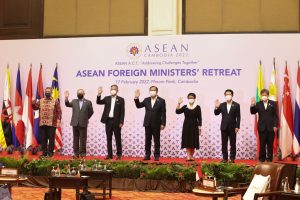Foreign ministers from the Association of Southeast Asian Nations (ASEAN) met for an annual retreat yesterday in the Cambodian capital Phnom Penh, under the shadow of the deepening crisis in Myanmar.
The informal ASEAN Foreign Ministers’ Retreat took place without the foreign minister appointed by Myanmar’s military junta, who was excluded from the meeting due to the latter’s lack of implementation of ASEAN’s Five-Point Consensus peace plan. Myanmar’s military government subsequently announced that it would prefer not to participate in this week’s meeting rather than sending a “non-political” representative.
The announcement came after disagreement within ASEAN over whether to permit Myanmar to participate in the bloc’s meetings. After Senior Gen. Min Aung Hlaing was uninvited from last October’s virtual ASEAN Summit, Cambodia’s Prime Minister Hun Sen — this year’s ASEAN chair — expressed a desire to welcome Myanmar back into the ASEAN fold, and traveled to Myanmar for direct talks with military chief Min Aung Hlaing last month. But he relented after encountering unusually strong pushback from fellow ASEAN leaders and witnessing the obduracy of the military junta, which despite its honeyed promises, showed little movement on the implementation of the Five-Point Consensus.
While the “ASEAN 9” appear to be united on the question of the junta’s non-participation in major ASEAN meetings, at least for now, Cambodian Foreign Minister Prak Sokhonn, ASEAN’s current special envoy to Myanmar, said that his government was still holding out hope that pragmatic engagement would bear fruit. “For the time being, we want to keep alive the hope, to continue to engage with Naypyidaw, especially the hope to keep trust and confidence alive,” he told a news conference after the meeting.
Sokhonn added that he was seeking to visit the country next month and appealed to the military junta to permit him to talk with representatives from the shadow National Unity Government (NUG). “We are trying to find a way, of course … If Naypyidaw is not speaking with the NUG so let the special envoy as the bridge, as the facilitator, speak,” he said, according to Reuters.
While the disagreement over the involvement of junta’s foreign minister in this week’s meeting has dominated headlines and public discussions for several weeks, it has papered over the broader difficulties that the bloc is facing in addressing the crisis in its errant member state. Yesterday’s meeting concluded without meaningful progress on the Myanmar issue – unsurprisingly, given the nature of the Myanmar military and the zero-sum nature of the country’s current crisis.
Given the Tatmadaw high command’s cloistered worldview and proven willingness to endure prolonged and painful international isolation in defense of its perceived interests, there is no indication that the junta’s exclusion from ASEAN meetings will be sufficient to force it to engage in good faith negotiations. It is also unlikely that the NUG and its allies would be willing to take part in dialogue with a military dictatorship that deems them “terrorists” and against which it has launched an armed revolutionary insurrection.
As I’ve noted before, any discussions of ASEAN’s failures in addressing the crisis in Myanmar have to acknowledge the fact that crisis is currently highly resistant to any sort of negotiated solution. Meanwhile, the alternative approach — choosing a side, recognizing the opposition forces, and helping them overthrow the military junta and rebuild Myanmar’s politics along more inclusive and democratic lines — commands little to no support among the ASEAN 9. One can regret this, but it is unsurprising given that such a radical approach has also attracted scant support among the Western nations that have been so vocal in their support for Myanmar’s democracy.
Indeed, the day before yesterday’s foreign ministers’ retreat, Prime Minister Hun Sen acknowledged the challenges, even as he lashed out at those who criticized his outreach to the military junta. “I’m in a situation where I’m damned if I do and damned if I don’t, so just let it be,” the leader said at the unveiling of a bridge in eastern Cambodia, expressing frustration at the obduracy of the military junta. “How can the cart move forward when the oxen are in front of it?”
But he also defended his government’s direct approach to negotiations, and pledged to continue his efforts. “The quest for peace in the morning does not come back with result in the evening,” he said.

































